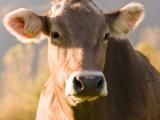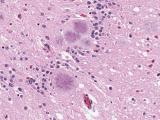Apr 9, 2004 (CIDRAP News) – The US Department of Agriculture (USDA) has rejected a Kansas beef company's proposal to test all its cattle for bovine spongiform encephalopathy (BSE) in a bid to reopen Asian markets for the company's meat.
The department told Creekstone Farms of Arkansas City, Kan., yesterday that its request for a license to use rapid BSE tests in a private marketing program cannot be granted, according to a statement today by Bill Hawks, USDA undersecretary for marketing and regulatory programs.
"The test is now licensed for animal health surveillance purposes," Hawks stated. "The use of the test as proposed by Creekstone would have implied a consumer safety aspect that is not scientifically warranted."
Before the discovery of a single BSE case in Washington state last December, Creekstone had been exporting 15% to 20% of its meat to Japan, company officials have said. The BSE case prompted Japan and many other countries to ban American beef. Japan tests all its own cattle for BSE and wants the United States to do the same as a condition for lifting the import ban.
The USDA announced a major expansion of its BSE testing program in mid-March but has rejected calls for testing of all cattle, saying it is not scientifically justified. Hawks' statement today mentioned the plan to increase testing and noted that an international panel of BSE experts concluded that testing of all cattle is unnecessary because the disease doesn't appear in younger animals.
"We are continuing our discussions with all of our trading partners so that trade can resume based on international scientific standards set by the World Organization for Animal Health," Hawks' statement concluded.
Creekstone's proposal to test all its cattle surfaced in late February. The company planned to set up its own laboratory and use a rapid test to get results in about 4 hours. Under the plan, any carcasses that tested positive would be destroyed, the company said. The firm slaughters about 1,000 head of cattle daily.
CIDRAP News was unable to reach Creekstone officials today for comment on the USDA decision. But a report today by Meatingplace.com, a meat industry news service, said Creekstone may fight the USDA decision in court. In a letter to Creekstone employees, company officials vowed to "fight this decision in order to provide what our customers want and maintain the viability of our plant," according to the report.
The story quoted John Stewart, Creekstone's chief executive officer, as saying the company has laid off about half its workers and has been losing about $40,000 a day because of the Japanese and South Korean ban on US beef.
More BSE screening tests approved
When the Creekstone proposal was first reported, the USDA had not approved any rapid BSE tests. Since then it has approved several, including three this week. On Mar 29 the department announced that seven state veterinary labs would help in the expanded BSE surveillance program, using rapid screening tests. Any samples that tested positive in the screening tests would undergo confirmatory testing at the USDA's national veterinary lab in Ames, Iowa, officials said.
The USDA granted temporary approval of three rapid BSE tests this week, pending submission of further documents, according to Andrea McNally, a spokeswoman for USDA's Animal and Plant Health Inspection Service (APHIS) in Washington, DC.
Roche Diagnostics of Indianapolis received a USDA permit to distribute and sell a BSE test made by Prionics AG, a Swiss firm, McNally told CIDRAP News. The Prionics test is a Western Blot test called Prionics-Check WESTERN, according to a Prionics statement. The company says the test was used 18 million times from 2001 through 2003, with no false-positive results.
McNally said the USDA granted Pierce Biotechnology, Rockford, Ill., a license to produce another Prionics test, this one an ELISA, or enzyme-linked immunosorbent assay.
In addition, McNally said Abbott Laboratories of Abbott Park, Ill., has received a USDA permit to distribute and sell a BSE test made by Enfer Scientific Ltd. of Ireland. The Enfer test is approved for cattle testing in Europe and Japan and has been used on more than 3 million samples, according to an Abbott news release.
The USDA previously approved rapid BSE tests made by Bio-Rad Laboratories, Hercules, Calif., and IDEXX Laboratories Inc., Westbrook, Me.
DeHaven named head of APHIS
In other developments, Ron DeHaven, who managed the USDA's investigation of the BSE case, was named today as the new administrator of APHIS. DeHaven, who has been deputy administrator of APHIS for veterinary services for the past 2 years, replaces Bobby Acord, who retired Apr 3, according to a USDA news release.
DeHaven's appointment was announced by Agriculture Secretary Ann Veneman.
See also:
Apr 9 USDA news release on appointment of DeHaven to head APHIS
http://www.usda.gov/wps/portal/usda/usdahome?contentidonly=true&contentid=2004/04/0140.html
















